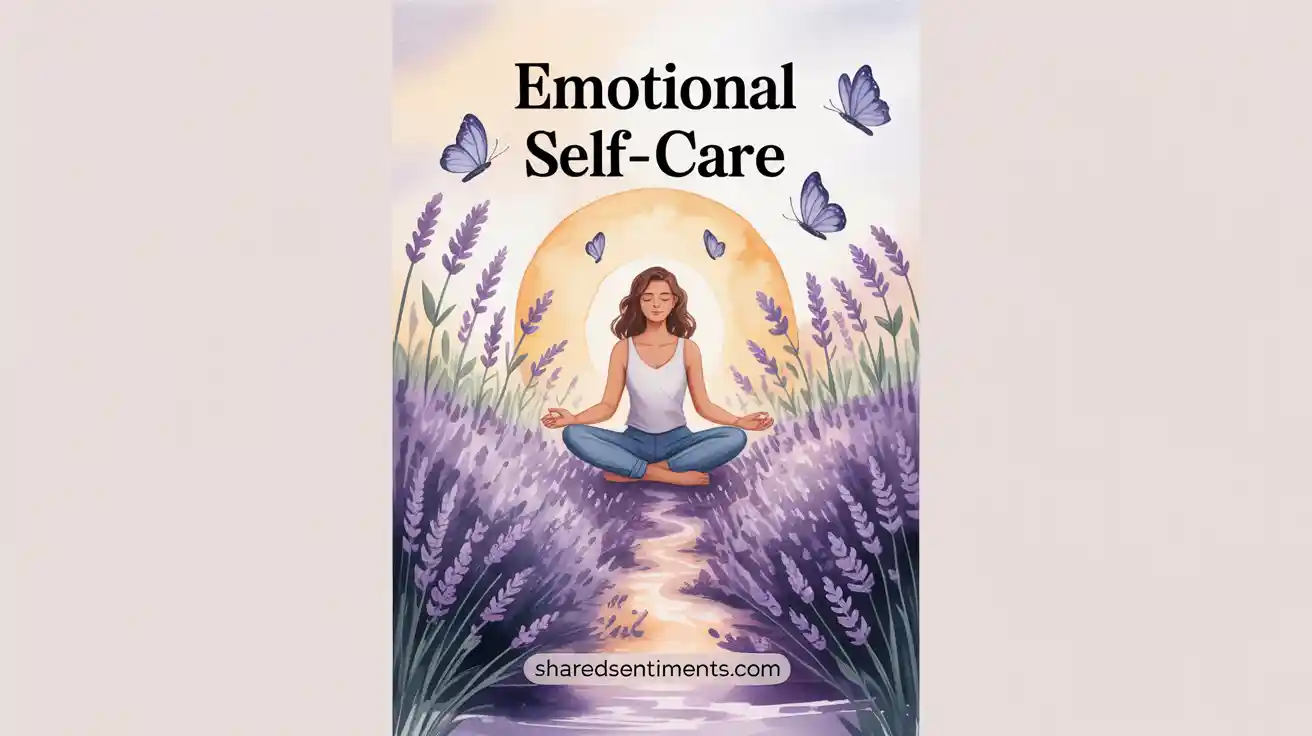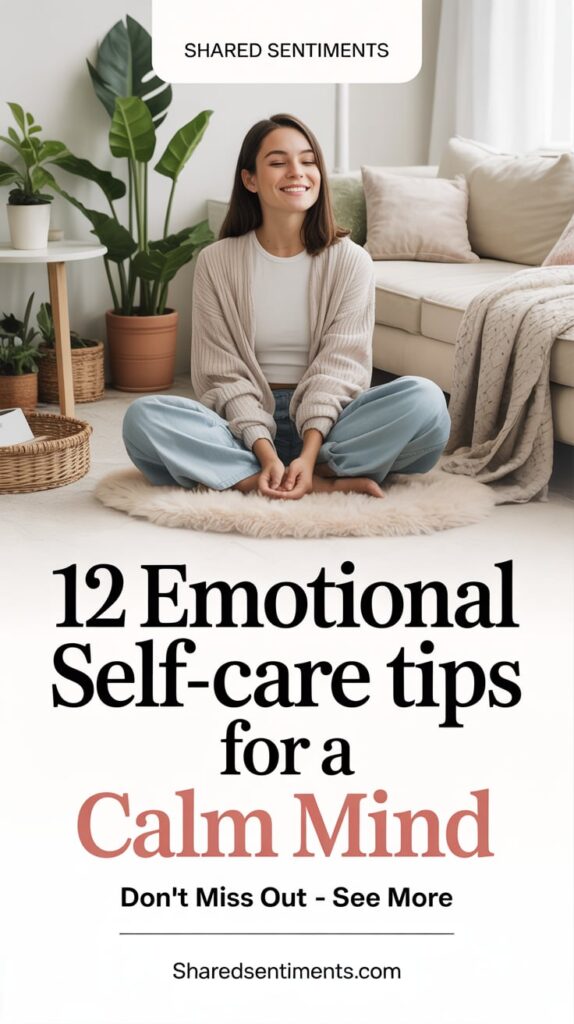Emotional Self-Care: 12 Steps That Help Me Stay Balanced and Connected

Have you decided you want to get better at emotional self-care? You’re in the right spot.
I’m sharing 12 ways to help you handle your feelings with more care. Take your time reading this. You might need it more than you think.
What Does Emotional Self-Care Mean?
Do you sit with your feelings and let yourself feel them? Do you grab a journal and fill the pages?
Maybe you pick up books that boost your mood but forget about them when stress takes over.
It can be all of those things. But it’s not just another routine to check off your list.
Emotional self-care isn’t a popular term you hear and then brush aside.
It’s the way you treat your feelings and the habits you build to support them.
Emotional self-care means you notice your emotions and give them space, even when other parts of life compete for attention.
It’s about caring for your feelings as you would for someone you love.
This should be a natural part of life. But constant demands and busy schedules pull you away from it.
With so much happening every day, tending to your emotions can feel huge.
But if you’re open to trusting this process, it can help you feel more grounded.
It takes time to learn to put your feelings first. But it’s not something you can ignore.
There are so many reasons to start caring for your emotions (maybe not a gazillion, but enough to matter). I hope you’ll give it a chance.
Benefits Of Emotional Self-Care
- You feel stronger and more steady
- You feel valued
- Life feels more steady and fair
- You feel closer to who you are
- Your confidence grows
- Your self-respect improves
You could keep adding to this list forever. But if you want these changes, you have to show up for your emotions.
They need your attention and care. Treat them like trusted friends who deserve kindness.
It’s easy to judge yourself, but being gentle with your feelings takes real effort. That’s what we’ll focus on next.
Save this post if you want to come back to it later. 🙂
This guide is here to help you master emotional self-care with 12 honest practices that match the way you feel. Let’s get started.
Maybe a few of them can help you too.
How To Master Emotional Self-Care (12 Gentle Practices)
1. I Let Myself Feel Things Without Rushing Through Them
There were times I’d pretend I was fine just to avoid a breakdown.
I’d laugh things off, change the topic, or distract myself with a screen.
But that only made things worse.
Now, I give myself permission to feel angry, sad, frustrated—whatever shows up.
I sit with the feeling instead of pushing it away.
It usually passes much quicker when I stop fighting it.
That’s emotional self-care for me: being honest with myself.
2. I Set Boundaries That Protect My Energy
There’s a huge difference between being kind and being a doormat.
I used to say yes to everything because I didn’t want to upset people.
But I ended up resentful, tired, and overwhelmed.
Now, I say no more often—and I don’t feel bad about it.
My peace matters too.
Boundaries aren’t about being rude; they’re about being real.
If something drains me, I take a step back.
That one change has helped me more than I ever expected.
3. I Stay Off My Phone When My Mind Feels Fragile
Scrolling can feel like a break, but it’s really not.
When I’m already feeling off, social media just adds noise to my head.
Too many opinions, too many fake smiles—it messes with my mood.
So when I’m low, I log out.
Even an hour without my phone gives my brain room to breathe.
I focus on what’s in front of me.
I breathe deeper.
I come back to myself.
4. I Talk to Someone I Trust Instead of Holding It All In
Sometimes, I don’t even need advice.
I just need someone to listen without judging.
That alone can feel like a huge weight lifting off my chest.
I used to think I had to figure everything out on my own.
But now I know—talking is part of healing.
Whether it’s a friend, a sibling, or a therapist, reaching out helps me untangle what’s in my head.
Even if nothing changes, I don’t feel alone anymore.
5. I Give Myself Quiet Time, Even If It’s Just 10 Minutes
I used to fill every second of my day.
Music playing, TV in the background, always multitasking.
But I didn’t realize how badly I needed silence.
Now, I take 10–15 minutes every day to do absolutely nothing.
No sound. No stimulation. Just me, breathing.
It’s uncomfortable at first, but then something clicks.
I feel more grounded.
Like I’m back in my body instead of floating above it.
Silence isn’t empty—it’s a reset.
6. I Name What I’m Feeling Instead of Just Saying “I’m Fine”
When something’s wrong, and I don’t name it, it just simmers.
It leaks into everything else.
But if I say, “I feel rejected,” or “I feel ignored,” it gives the emotion shape.
Once it has a name, it feels easier to manage.
I don’t spiral as much.
I write it down if I can’t say it out loud.
Even just seeing the words helps.
It’s a small act of honesty that makes a big difference.
7. I Forgive Myself for Having Bad Days
I used to beat myself up for not being productive.
If I didn’t get enough done, I felt guilty and lazy.
But now I remind myself that rest is part of the process.
Some days I’m strong.
Other days I fall apart.
Both days are valid.
Forgiving myself when I feel off keeps me from sinking deeper.
I don’t need to be “on” all the time.
I just need to show up the best I can.
8. I Reconnect With My Body Through Movement
When my emotions are stuck, I can feel it in my shoulders, neck, and stomach.
So I move.
Not for fitness or weight loss—just to feel better.
Stretching.
Walking.
Even dancing in my room when no one’s watching.
It helps.
I breathe differently when I move.
My thoughts slow down.
I feel more alive.
Emotional self-care isn’t just in your head—it’s in your whole body.
9. I Do One Thing Each Day That Feels Just for Me
There’s something powerful about doing something purely because it makes me happy.
It doesn’t have to be productive.
Sometimes I draw.
Sometimes I rewatch a show I love.
Sometimes I make pancakes just because.
That tiny moment of joy can shift my entire day.
It reminds me that I matter.
That my needs aren’t always at the bottom of the list.
10. I Remind Myself That Feelings Don’t Last Forever
When I’m in it, it feels like the sadness or anxiety is going to stay forever.
But I’ve been through enough waves to know—that’s not true.
Feelings rise, peak, and pass.
I remind myself of this every time I feel stuck.
This is temporary.
This will pass.
I’ve made it through before.
I’ll make it through again.
Even that one sentence can give me the strength to wait it out.
11. I Keep a Small List of Things That Calm Me Down
When I’m overwhelmed, I forget what helps.
So I made a list.
It’s simple: take a shower, go outside, hold a warm drink, call a friend.
I keep it on my phone.
When my brain feels scrambled, I don’t have to think—I just pick one.
It’s my own little emergency kit.
It reminds me that I have tools.
That I’m not powerless.
Sometimes, that’s all I need to feel okay again.
12. I Don’t Pretend to Be Okay Just to Keep Others Comfortable
I used to smile through the pain because I didn’t want to burden anyone.
But all that did was leave me feeling invisible.
Now, I choose honesty over performance.
If I’m not okay, I don’t fake it.
That’s not drama.
That’s being real.
And realness invites connection.
People can’t support me if they think I’m always fine.
Being honest has brought me closer to the people who truly care.
If You’re Still Figuring It Out, That’s Okay Too
I’m not perfect at any of this.
Some days, I forget everything on this list.
But I keep trying.
That’s all emotional self-care really is—choosing to show up for yourself, over and over again.
Even when it’s hard.
Even when it’s messy.
You’re allowed to take care of your emotions in your own way.
And you’re not alone while doing it.







